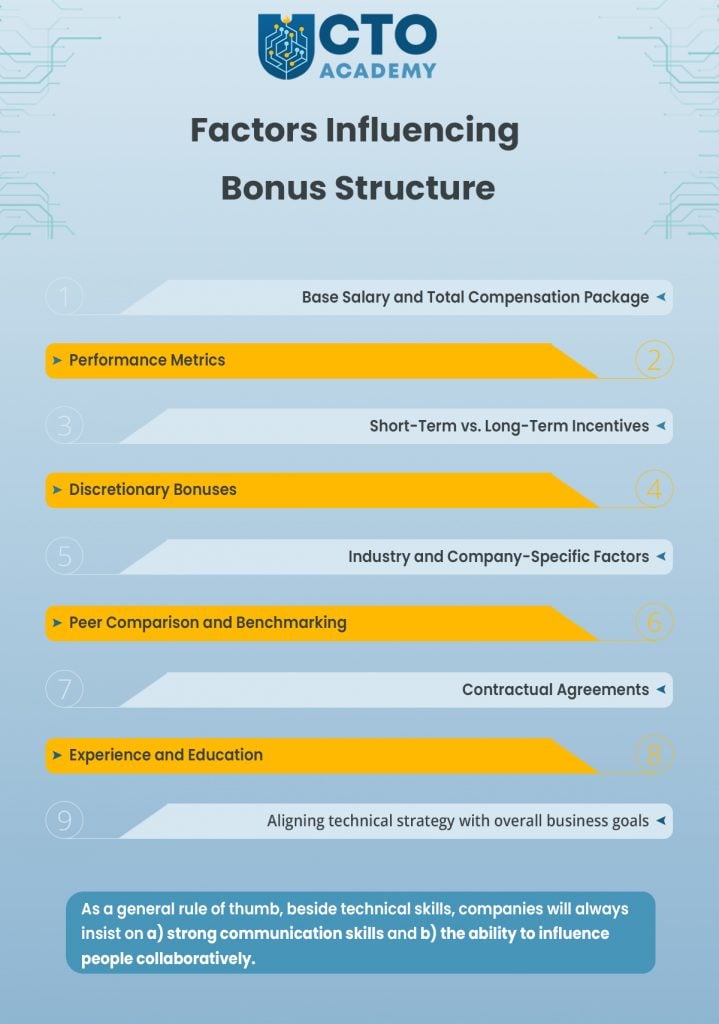The CTO bonus structure varies significantly depending on the company size, industry and overall compensation philosophy. However, several common elements and factors typically influence it.

Read more about the Salary vs. Equity vs. Time aka ‘The Start-Up Conundrum’
A performance bonus is often tied to specific performance metrics, which can be both quantitative and qualitative. Common performance metrics include:
In some cases, part of the CTO’s bonus might be discretionary, based on the board’s or CEO’s assessment of their overall contribution to the company.
Companies often benchmark their CTO compensation packages against industry standards to remain competitive and attract top talent. They use surveys and reports from compensation consulting firms to get insights into typical CTO bonus structures in similar roles.
The specific details of a bonus structure are often outlined in their employment contract, including clauses on bonus eligibility, performance reviews and other conditions.
Let’s use one of the recently published jobs for the role of Chief Technology Officer to see what requirements companies usually have. In this case, we are talking about a fast-growing business with further expansion plans. However, to expand, they first need to invest in IT infrastructure and technology.
In their own words, “The company needs a refresh of the technology stack and build a fit-for-purpose IT function that enables the growth of the business with the ability to leverage the overhead base.”
This is how this company envisions the future CTO:
TECHNICAL & BUSINESS SKILLS:
MANAGEMENT (SOFT) SKILLS:
This is where the right CTO program makes all the difference.
Performance-based bonuses are usually paid annually. They tie the pay to specific metrics (eg, revenue growth, product development milestones, successful technological implementations…)
This bonus can add 2.5 to 7.5% to the base salary. A Chief Technology Officer in a Fortune 500 company with a base salary of $500,000 could expect to receive a performance-based bonus of $12,500 to $37,500. If, however, the CTO’s performance is exceptional, they could receive a bonus of up to $50,000.
An equity-based bonus is, effectively, an ownership stake in the company. It is common in start-ups and private companies. The incentive lies in future growth because with growth comes an increase in the company’s valuation which turns the equity into a source of wealth.
An example we also mentioned in the article comparing CTO salaries in the US and UK is Andy Bechtolsheim, a co-founder and former CTO of Sun Microsystems. Just two years after the IPO, the company reached $1 billion in sales. Since Bechtolsheim had an equity-based bonus, he immediately capitalised on the company’s increasing value.
A retention bonus encourages a Chief Technology Officer to stay with the company for a certain period. You can expect this type of bonus if a company is undergoing a transition or facing challenges.
Examples of conditions:
The bonus structure should always be designed to reward performance, incentivise innovation and align a CTO’s goals with the company’s strategic objectives.
But, in the end, each company tailors the structure to fit its specific needs and industry standards.
Finally, it depends on the stage and financial capabilities of the business.
Nonetheless, you should always keep in mind the following:
The more management and soft skills you add to your technical capabilities, the higher your value is in the market.
90 Things You Need To Know To Become an Effective CTO

London
2nd Floor, 20 St Thomas St, SE1 9RS
Copyright © 2024 - CTO Academy Ltd